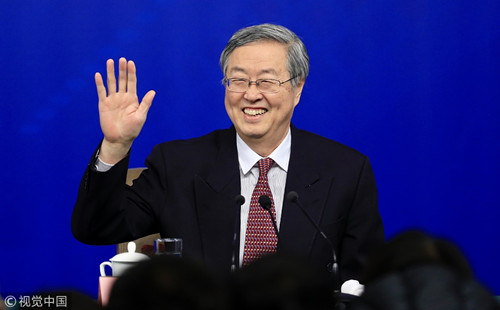Curbing debt leaves room for opening-up


Central bank governor Zhou Xiaochuan attends a news conference on the sidelines of the annual session of the National People's Congress in Beijing, March 9, 2018. [Photo/VCG]
China's once-expanding debt has been curbed under tightened governing measures and regulations, leaving more space for further financial opening-up and reforms, said Zhou Xiaochuan, the central bank governor, on Friday.
"We have entered a stage of stabilizing and gradually reducing the leverage level" after financial regulators cracked down on portions of the shadow banking business, Zhou, governor of the People's Bank of China, said at a news conference during the ongoing first session of the 13th National People's Congress.
Given the regulatory improvements and risk reduction, steps toward other financial reforms would be "faster and larger", including pushing forward the yuan's internationalization and lowering market access barriers in the financial sector, he said.
Improvement of the financial regulatory framework, targeted at prevention of systemic risks in a more efficient way, should be part of overall financial reform, said Zhou, adding that the central bank will play a more important role in the restructured regulatory system.
In November, the country established a new financial regulatory body, the Financial Stability and Development Committee, under the supervision of the State Council, China's Cabinet. The committee is expected to better coordinate supervision functions among banking, securities and insurance regulators while fixing loopholes by issuing unified rules.
Premier Li Keqiang, in the Government Work Report he delivered on Monday, said the nation's "prudent monetary policy will remain neutral, with easing or tightening only as appropriate". While the report did not include the annual growth target for M2, the broad measure of money supply, or expected credit growth, he said, "We need to make sure that the valve of aggregate monetary supply is well under control, we maintain moderate growth of M2 money supply, credit and aggregate financing, and ensure a reasonable, stable level of liquidity."
Yi Gang, vice-governor of the central bank, said at the news conference on Friday that indicators including market interest rates and the level of excess reserves could be used to measure the liquidity situation as M2 gradually becomes weaker as a measure of real economic growth.
The country's new yuan-denominated loans in February stood at 839.3 billion yuan ($132.5 billion)-326.4 billion yuan less than in the same period a year earlier, marking a significant decline from a record-high 2.9 trillion yuan in January, central bank data showed.
Zhu Haibin, chief China economist with JPMorgan Chase & Co, said, "We look for financial and corporate deleveraging efforts to continue in 2018, with further moderate slowing in overall credit growth."
He said he expected no change in benchmark interest rates this year. However, if there's a surprising increase in inflation with growth momentum holding up well, or rising inflation along with market expectations for more aggressive rate hikes by the US Federal Reserve, "the likelihood of a policy rate hike cannot be excluded".
MOST POPULAR
- 1 China to continue opening up its mega-market to world: premier
- 2 Policies concerning expats, foreign enterprises in November 2025
- 3 China to enhance convenience for inbound tourism: minister
- 4 Departure tax refund applications surge 285% as inbound tourism rebounds
- 5 China's foreign trade up 3.6% in first 11 months of 2025







